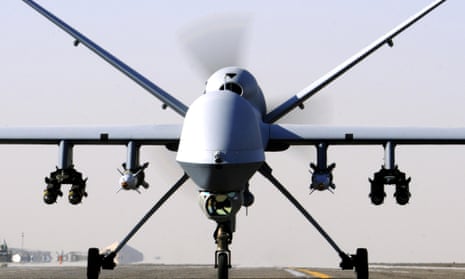UK military personnel are suspected of having participated in the CIA’s controversial drone war in Pakistan, which has resulted in thousands of fatalities.
The Ministry of Defence has declined to answer a Freedom of Information request that would confirm whether its personnel have been embedded with US military teams operating drones in the skies above the country. The MoD said that it would neither confirm nor deny the situation because it might jeopardise “international relations”.
However, it insisted that the UK had never conducted its own drone flights over Pakistan. When pressed, an MoD spokesman said: “UK personnel embedded with the US air force have only flown remotely piloted aircraft systems in support of operations in Afghanistan, Libya and Iraq.”
The carefully worded response leaves open the possibility that drones flown by UK personnel have been operating over the remote tribal regions of Pakistan that adjoin Afghanistan.
The MoD’s refusal to clarify appears at odds with comments made by defence secretary Michael Fallon, who has said that “if we are asked to give details” about UK personnel embedded with other countries “we, of course, do so”.
The RAF has long emphasised that its drones operate only in defined theatres of conflict, such as Afghanistan and Iraq, unlike the US which wages covert campaigns in Pakistan, Yemen and Somalia. However, it has been confirmed that scores of UK personnel are based at the Creech airbase in Nevada, from where CIA drone missions are operated. A handful of UK personnel are known to have been embedded with US teams, raising questions about who ultimately has authority over them.
Last year the former head of GCHQ, David Omand, called for safeguards to ensure that RAF pilots embedded at Creech did not “inadvertently collude” in drone actions “contrary to international law”. Omand distinguished the UK drone programme from what he called the “sinister cultural and political salience” of US drone operations.
Jennifer Gibson of human rights group Reprieve, which filed the FOI request, said the refusal to confirm whether UK personnel had been involved was troubling. “This refusal suggests that we may be embroiled in the CIA’s secret wars in far greater ways than was thought,” Gibson said. “Given the CIA’s drone programme in Pakistan has killed hundreds of civilians while operating without public accountability, that is cause for serious concern. What more don’t we know?”
According to the Bureau of Investigative Journalism, which tracks them, there have been 421 drone strikes in Pakistan, 370 of which have occurred under the Obama administration.
Many are termed “signature strikes,” which are based upon patterns of behaviour, rather than confirmation that a target had been identified. The bureau estimates at least 2,400 people have been killed in the Pakistan strikes, of whom more than 420 may have been civilians.
Confirmation that UK personnel have been involved in the CIA’s Pakistan drone programme would raise fresh questions for the government after it revealed last week that two British militants had been killed in RAF drone strikes in Syria. David Cameron told MPs that the strikes were legal because they were taken to prevent attacks on the UK. But some experts questioned whether the alleged attacks were imminent, throwing into question their legitimacy.
There has been a long-running debate in the US over the legality and efficacy of its drone programme. “Numerous senior military and intelligence figures have warned that secret drone programmes of this kind can actually make the situation worse, not better,” Gibson said. “Before heading down this path, we need a real debate, and real answers from the PM … We need to think very carefully about whether giving our government carte blanche to kill people anywhere in the world, without oversight, is really a good idea.”
The UK’s deployment of embedded drone pilots was not revealed until 2013 when defence minister Andrew Robathan told parliament that they had flown US unmanned aerial vehicles in Afghanistan. Robathan subsequently had to update his statement to confirm that they had also flown drones in Iraq and Libya under arrangements dating back to 2006.
Meanwhile, Britain’s largest Islamic organisation warned that last week’s drone attack in Syria risked actually exacerbating the terror threat to the UK by potentially persuading more foreign fighters to join Islamic State (Isis).
The Muslim Council of Britain, an umbrella body that represents 500 Islamic organisations around the country, said that the strike had prompted consternation and appeared to contravene the UK’s adherence to the rule of law and due process.
In its first statement on the incident, the MCB said that the killing of Reyaad Khan risked fuelling the “narrative of western duplicity” that terrorism experts say helps Isis recruit new members.
Cameron has defended the lethal strike by saying that his primary responsibility as prime minister was “to keep the British people safe” and that there was no other means available to stop Khan from directing terror attacks against the UK.
The MCB statement said: “These drone strikes raise serious questions about parliamentary authority, which resoundingly rejected permission to attack in Syria.
“Furthermore, we are concerned that the drone attack targeted at British citizens does not fit well with our commitment to rule of law and due process. These are fundamental British values that we should all champion; not doing so may in fact inadvertently feed into terrorists’ narrative of ‘western duplicity’.”
